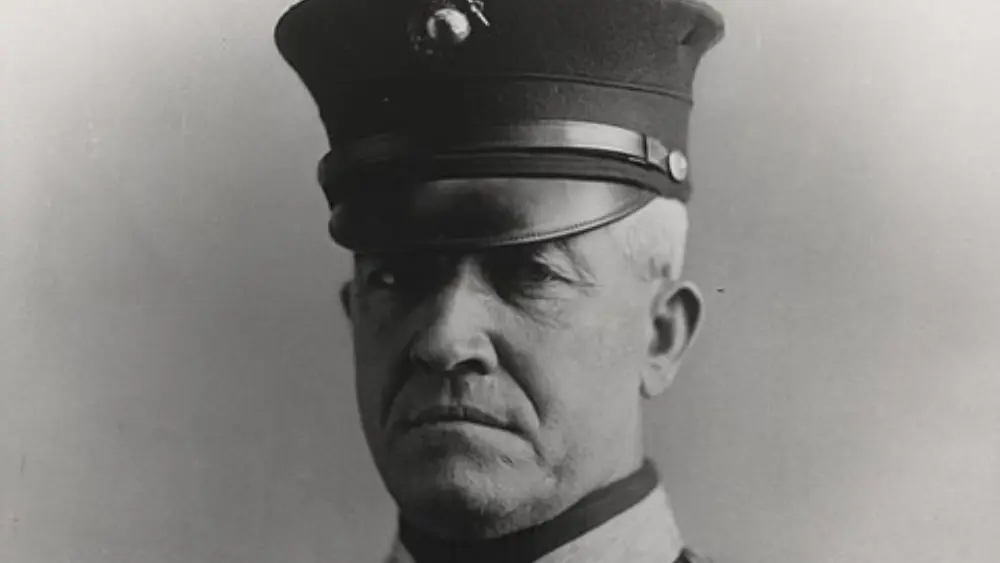Daniel Joseph Daly, born on November 11, 1873, in Brooklyn, New York, is celebrated as one of the United States Marine Corps’ most legendary and decorated enlisted Marines. Revered for his courage, fierce determination, and battlefield heroics, Daly remains an enduring symbol of Marine Corps valor. His life and military service are etched into the annals of American history, with one moment in particular standing above the rest: his now-iconic battlefield cry during World War I—“Come on, you sons of bitches, do you want to live forever?” That defiant roar, delivered amidst the chaos of the Battle of Belleau Wood, continues to capture the essence of the Marine fighting spirit.
Early Life and Enlistment
Dan Daly’s story begins in the working-class neighborhoods of Brooklyn, New York, where he was born to an Irish-American family. His early years were shaped by modest means, strong family values, and the principles of hard work and personal responsibility. Growing up in Long Island, he was surrounded by a tight-knit immigrant community that valued service, faith, and perseverance. The young Daly was a quiet, observant boy with a keen interest in history and current events, reportedly developing a fascination with military life from an early age. His upbringing, though humble, laid the foundation for the inner strength and determination that would later define his military career.
Before enlisting, Daly held various odd jobs and reportedly dabbled in amateur boxing, which helped hone his physical conditioning and mental toughness. At the age of 26, in 1899, Daly answered a call that would define the rest of his life—he enlisted in the United States Marine Corps. He joined the Marine Corps out of patriotism, a thirst for adventure, and a desire to break free from the limitations of his economic circumstances. What started as a step toward personal growth quickly evolved into one of the most celebrated military careers in American history.
Dan Daly: Boxer Rebellion and First Medal of Honor
Shortly after he enlisted, the Marine Corps deployed Daly overseas to fight in the Boxer Rebellion in China—a violent, anti-foreign, anti-Christian uprising that began in 1899 and escalated dramatically in 1900. The conflict centered on expelling foreign powers and missionaries from Chinese soil. The United States, along with several other nations, formed the Eight-Nation Alliance to quell the rebellion and protect their nationals and interests.
During this turbulent campaign, Daly distinguished himself with extraordinary acts of bravery. While stationed at the besieged foreign legations in Peking (now Beijing), he volunteered for perilous duties, often risking his life to safeguard his fellow Marines and allies. One of the most legendary episodes involved Daly single-handedly defending his position against repeated enemy attacks, reportedly killing numerous enemy combatants and holding his ground until reinforcements could arrive. His fearless actions, executed under relentless fire and extreme danger, earned him his first Medal of Honor in 1901.
This commendation marked the beginning of Daly’s legend. Not only did he perform heroically in a foreign land, but he also set a standard of excellence and sacrifice that would characterize the rest of his career. The Medal of Honor citation highlighted his “distinguished conduct in the presence of the enemy,” an understatement for a Marine who fought with unmatched courage and resolve.
Service in Haiti and Nicaragua
Daly’s Marine Corps service continued to take him across the globe, with significant deployments in Haiti and Nicaragua—two countries central to early 20th-century U.S. foreign policy in the Caribbean and Central America. These campaigns, part of the broader “Banana Wars,” aimed to protect American interests and bring stability to regions experiencing political turmoil.
In Haiti in 1915, Daly was once again called to act under extreme conditions. During a nighttime ambush by Caco rebels—Haitian insurgents resisting American intervention—Daly and a small group of Marines came under sudden and intense attack. Demonstrating remarkable composure and skill, Daly not only led the counterattack but reportedly saved wounded comrades while under fire and retrieved a machine gun from a river to continue the fight. His leadership and quick decision-making proved vital in the Marines’ success in overcoming the ambush.
Later, in Nicaragua, Daly continued to exemplify the Marine Corps values of honor, courage, and commitment. He served with distinction during operations against insurgents and contributed to efforts that reinforced U.S. political and military influence in the region. These missions, though controversial in historical retrospect, provided Daly with yet another stage on which to showcase his leadership, courage, and tactical expertise.
These campaigns didn’t earn him additional Medals of Honor, but they added to his growing legend and proved that his heroism extended beyond a single battlefield or moment in time. Instead, Dan Daly consistently rose to meet every challenge, no matter the terrain or opponent.
Dan Daly: World War I Heroism
Dan Daly’s most famous exploits would come during World War I, where he served as a member of the American Expeditionary Forces in France. By this time, Daly had already achieved legendary status among Marines, yet his heroism during this global conflict would elevate him even further in the public eye.
Assigned to the 6th Marine Regiment, Daly participated in some of the bloodiest battles of the war. The most notable was the Battle of Belleau Wood in June 1918, a fierce engagement that became a defining moment for the Marine Corps. Facing entrenched German forces in dense woods, Daly’s unit was ordered to advance under withering machine gun and artillery fire.
As the Marines prepared to charge, Daly turned to his men. He shouted the words that would echo through Marine Corps history: “Come on, you sons of b*tches, do you want to live forever?” The phrase was both a call to courage and a challenge to fear. It galvanized his fellow Marines, igniting a fierce and determined charge that helped turn the tide of the battle.
His leadership and valor in Belleau Wood earned him the Navy Cross, one of the highest decorations for valor in combat. Though he was nominated for a third Medal of Honor, the Marine Corps decided against awarding it, as he had already received two. Nevertheless, his actions at Belleau Wood are universally regarded as Medal-of-Honor-worthy, and his battlefield legacy was permanently secured.
Second Medal of Honor
Andy Rooney: Reporting on World War II Prior to his legendary World War I service, Daly had already become one of only 19 servicemen in U.S. history to receive two Medals of Honor. He earned his second Medal of Honor for his actions in Haiti in 1915. During that engagement, he retrieved a machine gun from a river and led a fearless charge against a larger rebel force.
The citation praised his “conspicuous gallantry in action,” again showcasing how Daly repeatedly put himself in harm’s way to protect his fellow Marines and accomplish the mission. With this second Medal of Honor, Daly joined a rarefied group of double recipients, sharing the distinction with another Marine legend, Smedley Butler.
Receiving a Medal of Honor is a rare feat in any military branch. Receiving two is virtually unheard of and reserved only for those whose acts of bravery go far beyond the call of duty. Daly’s twin honors are a testament to the kind of warrior he was: relentless, fearless, and entirely dedicated to those he served beside.

Retirement and Later Years
Dan Daly retired from active service in 1929 after a 30-year career that spanned multiple wars and military campaigns. He had risen to the rank of Sergeant Major, the highest enlisted rank in the Marine Corps, and remained highly respected both within the military and among the American public.
In civilian life, Daly lived quietly and modestly, never seeking fame or attention. He worked as a bank guard and remained involved with the Marine Corps community, often speaking at events and mentoring younger Marines. Daly downplayed his battlefield achievements with characteristic humility, often deflecting praise by saying, “I only did my duty.”
Dan Daly passed away on April 27, 1937, at the age of 63. They buried him with full military honors at Cypress Hills National Cemetery in Brooklyn, New York—his birthplace and final resting place.
Dan Daly: Enduring Legacy
The legacy of Dan Daly continues to influence the Marine Corps and the broader military culture of the United States. The Marine Corps celebrates its courage, leadership, and selfless dedication to duty in history books, museum exhibits, and recruit training curricula. Instructors still teach his legendary quote from Belleau Wood to new Marines, using it to symbolize the fearless mindset expected of every warrior in uniform.
Dan Daly embodies more than medals and battlefield heroics. He proves that one person, driven by unwavering determination and a deep commitment to others, can change the course of history. His story is not just one of war and valor, but one of purpose and principle. He served not for glory, but because he believed in duty, honor, and country.
Today, Marine Corps facilities, buildings, and even naval vessels bear his name, ensuring that his legacy lives on. For generations to come, Marines will continue to look to Dan Daly as the epitome of what it means to wear the uniform with pride and to live the core values of the Corps.
Dan Daly was more than a hero; he was, and remains, a symbol of what the very best of the U.S. Marine Corps looks like in action. His life reminds us that true greatness often resides in quiet determination, fierce loyalty, and the courage to lead when others falter.











